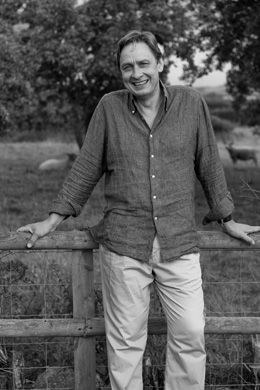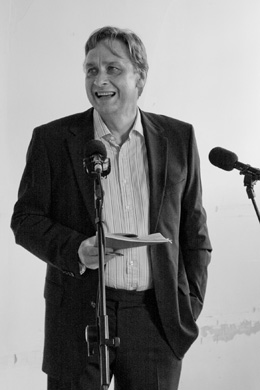A Biography
Why music? There was lot of it in my childhood home. My paternal grandfather was a part-time choral conductor, and my mother’s father was an above-average amateur pianist with a special love for Beethoven. I tried composing at around 8 or 9: at first impossibly ambitious attempts at symphonies which rarely got further than a couple of pages, and later a whole movement of a Concerto for Five Saxophones and Orchestra (needless to say, unperformed).
As a teenager I studied cello at the Northern School of Music, Manchester (later the Royal Northern College), and went on to study composition with Alexander Goehr at Leeds University. However composing soon dried up – I think I’d simply become too self-conscious. After a brief period working for the BBC’s vast Gramophone Library, I did a postgraduate course at Manchester University, researching and analysing Shostakovich’s String Quartets. Then two friends – the composer Robert Simpson and the record producer Andrew Keener – suggested I try musical journalism. This quickly grew into a full-time career.
Since then I’ve broadcast frequently for BBC Radio 3, 4 and World Service. Singling out the most enjoyable projects is hard, but I have to mention the series 14 programmes about the music of Anton Bruckner for the centenary of the composer’s death (1996), and the documentaries about the composers Dmitri Shostakovich (2006), Ralph Vaughan Williams (2008) – both nominated for, and the latter receiving a Sony Award (Gold). Until 2001 I doubled as a concert critic and newspaper journalist, writing regularly for The Independent, The Guardian, and Gramophone. During 1998-99 I was Chief Music Critic for The Scotsman. I still write for BBC Music Magazine, and (when time allows) books on music: titles include Bruckner Remembered (Faber), Mahler (Naxos) and Wagner (Naxos). From 2003-5 I lectured in music at Exeter University – until, that is, the distressing announcement of the music department’s closure in 2006.
I have now given up concert criticism (admittedly with some relief) and make my living entirely by writing and talking about music. Being regular presenter for Radio 3’s popular Discovering Music for fourteen years gave me particular pleasure. I also did similar concert presentations with BBC Scottish Symphony Orchestra, BBC Philharmonic and RTE Orchestra (Republic of Ireland). While I may have strong ideas and feelings about the music I discuss, I welcome responses from listeners more and more, even if they disagree strongly. It’s important to have one’s pet theories challenged.
While recovering from a serious depressive episode in 1997 I found I was able to compose again. I consulted my friend, the Danish composer Per Nørgård, and have since taken advice and encouragement wherever I can find it. After the premiere of my orchestral piece Behemoth Dances by the Moscow State Symphony Orchestra in 2016, I realised this was getting serious. Since then my Angel’s Arc (2019), for clarinet and string quartet, has done particularly well, clocking up seven performances, in three different countries. This has been followed by my String Quartet (2021) premiered by the Brodsky Quartet, two ‘cat studies’, The Nimble and Roguish Paw (2023), for cor anglais and clarinet and ‘five ghost stories for five instruments’, Unquiet Sleepers (2024), premiered at the Australian Chamber Music Festival. Two unaccompanied choral pieces, The Miracle Tree and This Going Hence, will be premiered by the Philharmonia Choir in May 2025.
I’ve also been concentrating on improving my skills as a pianist, partly as a tool for illustrating talks on music, but also because it gives me so much pleasure in itself. I particularly enjoy playing in chamber music, and accompanying my wife, Kate, a mezzo-soprano.
German is my second language, and I have occasionally worked as a translator: making English versions of the personal reminiscences included in my Bruckner Remembered, and providing the English translation of Georg Trakl’s poem Sebastian im Traum printed in the score of Hans Werner’s Henze’s ‘Salzburg Night-music’ Sebastian im Traum (Chester 2005). More recently I translated poetry by Christian Lehnert, as set by Henze in his choral work An den Wind (2011).
Since my early teens I have suffered from bi-polar depression. However I believe firmly that intense involvement in music is one of the factors that has enabled me to remain generally stable, particularly in my teenage years. With the help of my wife (a psychotherapist) and other specialists, I have explored the psychological and neurophysiological aspects of mental illness, and looked at how music can work upon us therapeutically, in the process throwing light on the way the human mind works, and even helping us make some kind of sense of our lives. I have explored these issues further in my work with The Musical Brain. Some of my – and others’ – thoughts on this can be heard in my radio documentary Shostakovich: A Journey into Light. This was later expanded into the Rubery Award-winning book How Shostakovich Changed My Mind (Notting Hill, 2017). More recently I produced a book about Mahler’s Eighth Symphony and the world in which it was created: The Eighth: Mahler and the World in 1910 (Faber, 2019). I am now working on a book about how music can speak to us in times of crisis, provisional title, Alone and Silent.


Stephen Johnson is not merely the most engaging broadcaster, but with his encyclopaedic knowledge of classical music he makes natural connections between different composers and their music which continue to entrance and enthuse musicians and non-musicians alike.
Robert Winston
